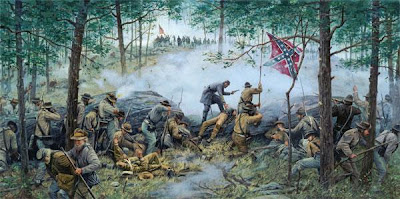"... When the guns began firing he had forgotten it completely. It seemed very strange now to think of morality, or that minister long ago, or the poor runaway black. He looked out across the dark field, could see nothing but the yellow lights and outlines of black bodies stark in the lightning."
In The Killer Angels (1975), Michael Shaara captures the human side of the Civil War, specifically the Battle of Gettysburg, by focusing on the key players involved. Much like the movie Titanic, there is no risk of spoiling the ending; everyone knows the South loses this famous battle and most of its men in the processes. However, Shaara breaths new life into an old story by taking it back to the people, by introducing the human element that history books lack, caught up in the whos and the whats but not the motivations, the relationships and the passions.
Not much one for historical fiction, not to mention gory war novels, I was riveted, rushing headlong into the bloody battle, knowing perfectly well how it would end but wanting the soldiers to live. I had become invested. They had become people.
They were real men fighting for a dream, for a cause, for a lie. Each of them with a different motive; each of them with something to prove: courage, loyalty, that they are better men than most. These men were not ordered to fight by a king but willingly volunteered for the Cause, for the idea. My heart ached for the friends, Armistead and Hancock, finding themselves separated by the war and as enemies at the top of Cemetery Hill. "If I lift a hand against you, friend, may God strike me dead." Breaking a vow of friendship for the sake of loyalty to an idea, a Cause. The reason for the war as varied as the perspective of players.
Does it matter in the end? Lee asks the question "If the ware goes on- and it will, it will - what else can we do be go on? It is the same question forever, what else can we do? If they fight, we will fight with them. And does it matter after all who wins? Was that ever really the question? Will God ask that question in the end?"
God must grow tired of being called down on both sides of a war.
Up next... The Travels of Jaimie McPheeters by Robert Lewis Taylor, winner of the 1959 Pulitzer.
Until then my friends... Happy reading.

No comments:
Post a Comment